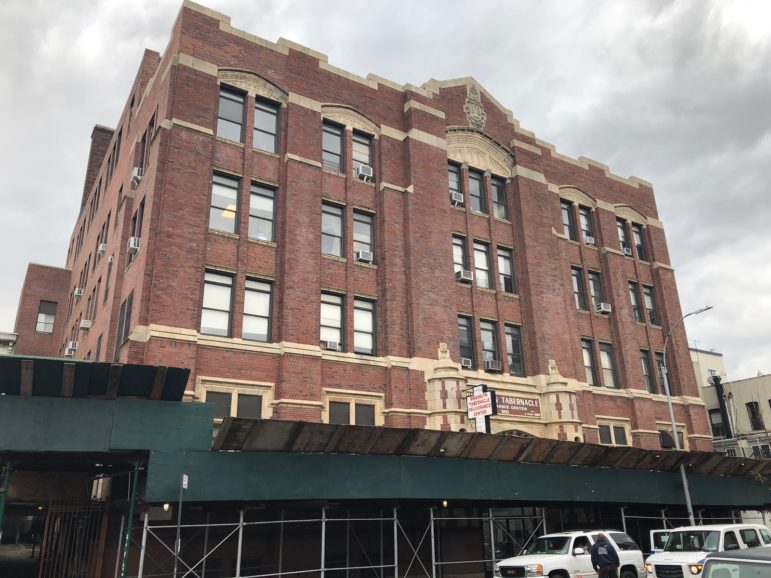
Zaheer Bowen/City Limits
Urban Dove Team Charter School’s original location on Lafayette Avenue in Brooklyn.
This story was produced through the City Limits Accountability Reporting Initiative For Youth (CLARIFY), City Limits’ paid training program for aspiring public-interest journalists.
A charter school with a unique educational model for disconnected youth is looking to open a site in western or central Queens.
Urban Dove Team Charter School, which currently has locations in Brooklyn and the Bronx, uses a sports-based educational model to reach under-credited high school students. It is looking to open a new site in either District 24, 25 or 30—a swath of the borough that includes neighborhoods like Flushing, Whitestone, Ridgewood, Corona, Jackson Heights, Astoria and Long Island City—according to Jai Nanda, a representative for the school who spoke about its plans at the Queens Community Board 2 meeting in November.
Nanda, the founder and executive director of Urban Dove, says the school is designed to serve students who struggle with peer relationships, attendance, and performance. Students receive academic guidance and support from coaches as well as teachers, and unlike most transfer high schools that require attendees to be between the ages of 16 and 21, Urban Dove accepts 15-year-old applicants.
“You can’t be older than sixteen and you can’t have more than eight credits. And if you fit those two criteria, and you fill out the application, then you’re in. And we’re the only school that does that,” Nanda says.
The school emphasizes health and fitness, and students work with coaches on team-building and collaborative skills—but they don’t need to be star athletes to succeed.
“I think it’s really more about getting them to build their self-esteem and to re-engage in school, and sort of understand that if the first year or two of high school doesn’t go well, that doesn’t mean you have to give up,” says Nanda. “So there’s a school there that you can reconnect with.”
Urban Dove is looking to open a site in western Queens because there’s a lack of transfer high schools in that part of the borough, according to Nanda. He says they’re also eyeing the area because of its many transit options, citing easy access to transportation as a factor that makes students more likely to attend school regularly.
“[For] the students that we serve who are disengaged from school, transportation to school is often one of the barriers to re-engagement, so if you can in [any] way make that easier for them, you sort of meet them where they are, so I think maybe we’ll have an advantage in that way,” he says.
Kym Watson, whose son Jakim was a member of the inaugural class at Urban Dove’s first location in Brooklyn’s Clinton Hill neighborhood, says the school has fostered relationships with other institutions in the community. Her niece is also a current student at the Brooklyn location.
“They’ve got a mentoring program that the students are engaged with, kids in a local elementary school, and they’re using some of the parks that are closer in the neighborhood,” she says. “Initially they didn’t, they did everything outside of the neighborhood, but now they’re much more connected and engaged in the community.”
Isaiah Miller, a current student at the Brooklyn school, agrees, crediting one of his coaches with his improvement as a student.
“I feel like I got better because of him. I feel like he’s the one that helped me get to where I am now,” he says.
Urban Dove’s original Clinton Hill site enrolled 266 students and had a 47 percent graduation rate during the 2017-18 school year, according to Department of Education (DOE) statistics. Its second Bronx location opened this past fall, and serves approximately 105 10th graders.
While they don’t have a specific location identified yet for their Queens site, Nanda says they’re looking, and aim to occupy a privately-owned property–as their Brooklyn and Bronx locations do–as opposed to leasing or sharing space in a public school building.
“That’s by far the biggest challenge, is finding that real estate and paying for it,” Nanda says. “But we’ve done it twice successfully and we think that because of the students that we are serving, we think the community will be supportive.”
Those looking to open a new charter school in the city must submit their plans and receive authorization by either the DOE, the state’s Department of Education or the State University of New York Charter Schools Institute.
Urban Dove hopes to be operational in Queens by 2020, Nanda says.









One thought on “Charter Network Looking to Open New Transfer School in Queens”
The de Blasio administration says it has started to deliver on promises of housing help, street improvements and business assistance. Tenant groups and business advocates, however, say their worries remain.